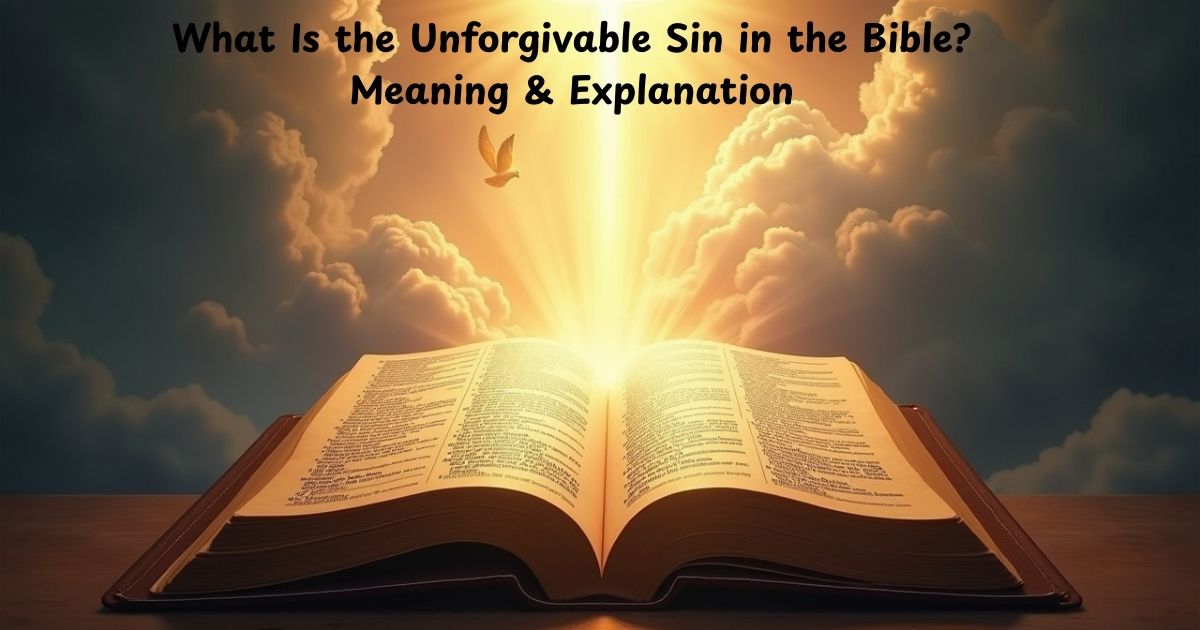The Bible teaches that God’s mercy is wide, yet it also speaks of a sin that cannot be forgiven. This raises questions: What is the unforgivable sin in the Bible? Meaning & explanation vary, but Scripture gives clear answers.
Many believers fear, “I’m scared I committed the unforgivable sin.” This article explores what Jesus meant, how it is explained in Scripture, and how believers can find hope in forgiveness.
What Does the Bible Say About the Unforgivable Sin?
The unpardonable sin is often called blasphemy against the Holy Spirit. Jesus explained that every sin and blasphemy can be forgiven, except this one. This isn’t just a passing mistake—it’s a persistent rejection of God’s truth and Spirit.
While some ask, “How many unforgivable sins are there?” the Bible focuses on one central eternal sin. It’s not about weakness, doubt, or a single action but about hardening the heart against God’s Spirit.
Where Is the Unforgivable Sin Mentioned in Scripture?

The Gospels: Matthew, Mark, and Luke
The Synoptic Gospels record Jesus’ teaching on the eternal sin:
- Matthew 12:31–32 – “Blasphemy against the Spirit will not be forgiven.”
- Mark 3:29–30 – “Whoever blasphemes against the Holy Spirit will never be forgiven; they are guilty of an eternal sin.”
- Luke 11:20 – Jesus connects the Spirit’s power with the kingdom of God.
In context, Jesus had healed and cast out demons. Religious leaders, however, claimed He worked by the power of Satan (Mark 3:22, Matthew 12:24). This was not ignorance but attributing God’s miracles to the devil, rejecting the Spirit’s clear witness.
Key Bible Verses to Know
- Matthew 12:31–32 meaning – All sins can be forgiven, except rejecting the Spirit.
- Mark 3:29–30 interpretation – An eternal sin rooted in calling God’s work satanic.
- 1 John 5:14–17 explanation – A “sin that leads to death” is contrasted with sins that do not.
- John 16:8 – The Spirit convicts the world of sin, righteousness, and judgment.
What Is the Blasphemy Against the Holy Spirit?
Blasphemy against the Holy Spirit is the denial of truth and repentance in the face of God’s power. It is rejecting the Holy Spirit’s witness about Jesus. This is why it’s unforgivable—because the Spirit is the one who draws us to repentance and salvation.
Without the Spirit, we cannot understand (1 Corinthians 2:14) or receive God’s grace. To blaspheme the Spirit is to close the door on forgiveness itself.
Why Is This Sin Called “Unforgivable”?

It’s unforgivable not because God’s mercy is weak, but because the heart refuses forgiveness. By calling the Spirit’s work satanic, a person rejects Christ’s blood and forgiveness.
Theologians explain it as:
- A sin that leads to spiritual death.
- A sin against the Spirit that blocks repentance.
- An eternal sin because it rejects the only source of salvation.
Common Misunderstandings About the Unforgivable Sin
Is Suicide the Unforgivable Sin?
Many ask, “Is suicide the unforgivable sin in the Bible?” While tragic, suicide is not identified in Scripture as the unpardonable sin. God alone knows the heart. The Bible teaches all wrongdoing is sin, but only blasphemy against the Spirit is called eternal.
Can Denying Jesus Be Forgiven?
Peter denied Jesus three times—yet he was forgiven. Denial, in weakness or fear, is not the unforgivable sin. The key difference: repentance restores. The unforgivable sin is persistent rejection, not momentary failure.
How to Know If You Have Committed the Unforgivable Sin
A common fear is: “I’m scared I committed the unforgivable sin.” But here’s hope—if you are worried, you have not committed it. The very fear shows your heart is still sensitive to the Spirit.
The unpardonable sin is marked by:
- Persistent rejection of God’s Spirit.
- Attributing Jesus’ miracles to Satan.
- A hardened heart that refuses repentance and forgiveness.
If you still long for God’s mercy, the Spirit is still working in you.
Can a Christian Commit the Unforgivable Sin?

True believers sealed by the Holy Spirit cannot lose salvation by accident. The sin against the Spirit is not a slip, but a lifelong rejection. Christians may stumble, fall into immorality, or struggle with doubt, but as long as they return in repentance, they are forgiven.
As 1 John 1:9 says: “If we confess our sins, He is faithful and just to forgive us.”
Lessons and Warnings for Believers Today
The lesson of the unpardonable sin is a warning against hard hearts. Like the Pharisees, we risk danger when we:
- Dismiss God’s power.
- Attribute miracles of Jesus and the Spirit to Satan.
- Reject God’s presence in Christ.
Believers must:
- Pray for forgiveness of sin (1 John 5:14–17).
- Trust in the blood of Christ and forgiveness.
- Stay humble, open, and ready for repentance.
Finding Hope, Grace, and Forgiveness in Christ
Though there is one unpardonable sin, the Bible assures us that all other sins can be forgiven—from shameless immorality to denial of truth. Even Paul once persecuted the church, yet through repentance and forgiveness, he became an apostle of grace.
Hope of salvation through Christ is greater than fear. As long as we respond to the Spirit’s call, God’s mercy is open.
Conclusion – Walking in Faith Without Fear
The question “What is the unforgivable sin in the Bible? Meaning & explanation” leads to one truth: it is the blasphemy against the Holy Spirit, a persistent rejection of God’s work. Yet for every believer who seeks forgiveness, Christ’s grace is greater than sin. Walk in faith, not fear, knowing the Spirit still leads you to hope, prayer, and eternal life in Christ.

Faraz Babar is a skilled wordsmith with a keen interest in the rich world of synonyms and language nuances. With a flair for simplifying complex vocabulary, he crafts content that’s both enlightening and enjoyable to read.











